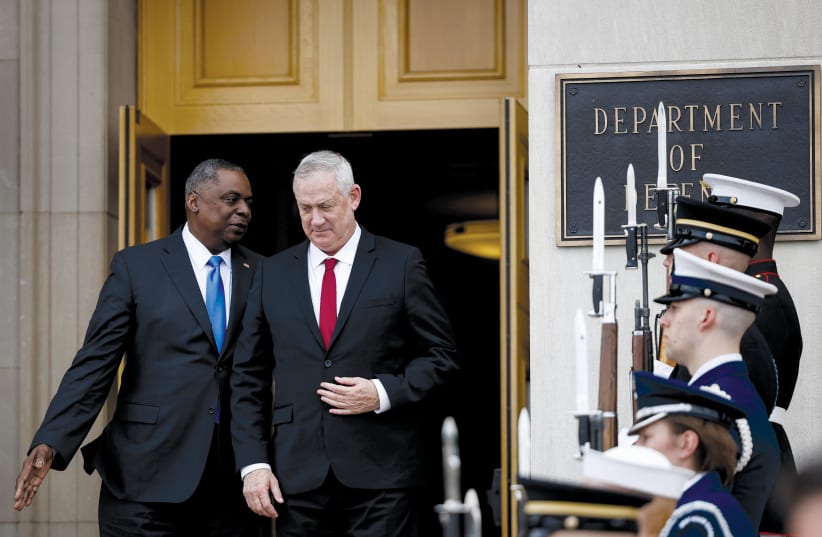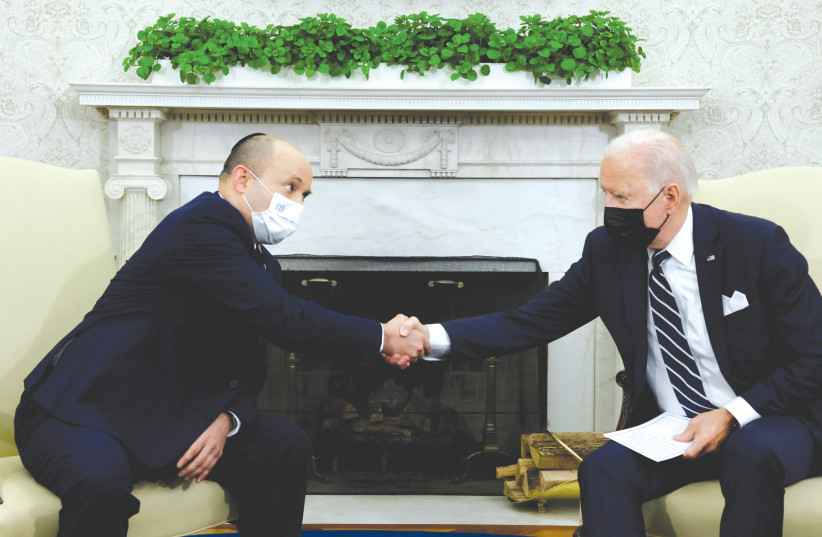I was asked by a White House aide this week in a phone call whether in my conversations with the current administration, or for that matter with former US president Barack Obama and a senior aide on his staff during those eight years, I was speaking as a journalist, analyst or as an advocate for Israel.
I have been asked this question before but never on this level, and not with the ramifications as great as in this conversation. I thought about it for a moment. In a way, my answer should have been obvious, but when you talk to the White House, you want to word things accurately.
I found myself giving the aide to US President Joe Biden a short biography.
“I moved from the United States to Israel because this is the Jewish homeland and I was fortunate that my immediate family had already been making the move when I graduated from college. By the time I had been in junior high in Brooklyn, I knew I wanted to be a journalist. But in those days, I was closely watching the Watergate hearings. My mind was more on US presidents than Israeli prime ministers.”
“Great background,” he interrupts. “But what about my question?”
“I am privileged to have been reporting on Israel for so many years as a journalist. I’ve been around long enough to be able to analyze what happens in the diplomatic and political realms, in particular. And if supporting this state as the Jewish state, and as a vibrant democracy, respectful of different views within this country, means that I’m an advocate, then I’m an advocate,” I replied.
I don’t think I breathed until I finished those sentences, wanting very badly to make sure that it came out the way I wanted to say it. It was especially sensitive for me because I have spoken out in the past against the concept of advocacy journalism, but as I said to the aide, “you wouldn’t expect an objective American journalist to be supportive of violent attacks on the US. And Israelis, including journalists, don’t want violence carried out or even threatened against their country.”
“I hope that you’re not feeling interrogated,” he said. “No, thanks for the challenge,” I laughed.
My previous conversations with this aide had been friendly though dealing, at times, with contentious issues. I believe, however, that the question with which he launched the phone call this time was indicative of the latest developments in US-Israel relations.
I decided to become a reporter again in our encounter, turn the tables, and start asking him the questions instead of the other way around.
“How would you classify the Biden administration’s relations with the Bennett government?” I asked.
“Excellent,” he retorted.
“Hey, my answer to you was longer,” I quipped. “Tell me more.”
“Seriously, the dialogue is great. The issues are weighty. We don’t always agree, but we’re talking and we’re talking as friends,” he elaborated.
“Do you feel the Israeli desire to give emphasis to the Iranian issue is at the risk of forgetting about the Palestinian issue?” I ask.
“No,” he replied curtly.
THERE WAS silence. “Listen,” he continued, “we don’t think that attacks on Palestinians by Israelis in the West Bank are like the threat of an Iranian nuclear bomb. Let’s not be ridiculous. We just don’t want the issue of settler violence overlooked.”
He was on a roll. “I’ll tell you something else. The administration has already developed a good relationship with Prime Minister [Naftali] Bennett, Foreign Minister [Yair] Lapid and Defense Minister [Benny] Gantz. We are well informed. We’ve been told by our people on the ground that a wrong move ‘Leftward’ on the Palestinian issue could destabilize the current Israeli government. We’re not here to get involved in your internal politics. We’re not here to topple the Israeli government. We support the Abraham Accords, but we’re also looking out for the Palestinians in their daily lives.”
Just as the aide had tested me at the beginning of our chat, I think he felt tested by me more than in previous conversations, again – in particular – due to the fact that the relations between Washington and Jerusalem are currently being tested.
Our discussion lasted about 15 minutes. This aide is Jewish and has shown that he is educated on Jewish history and tradition. We’ve spoken about Judaism before and wound up talking about it again before we hung up this time.
Our conversation took place on Tuesday right after the conclusion, Israel time, of the Tenth of Tevet fast, commemorating the beginning of the Babylonian siege on Jerusalem, which ultimately led to the destruction of the Temple and exile for the Jewish people.
“Did you fast?” he asked.
“Yes,” I replied.
“It was so long ago. Does this date really speak to you?” he challenged.
I told him that indeed it was a very long time ago but that the modern State of Israel is a continuation of Jewish history that has also included exile. We got into the weekly Torah portion. Jacob has just left the land promised to his grandfather Abraham and then to his father and now to him. It took a very long time but the Children of Israel eventually returned.
“In modern times, we’ve risen up from the ashes of the Holocaust,” I said, “and that isn’t just some expression.” I then told him that I have a child who was born in Jerusalem on the Tenth of Tevet and delivered by a midwife who was a Holocaust survivor.
For the second time in our conversation, there was a deafening silence. “Are you there?” I asked over the phone line. “Yes,” he replied. “I’m just absorbing what you just said.”
The writer is op-ed editor of The Jerusalem Post.

